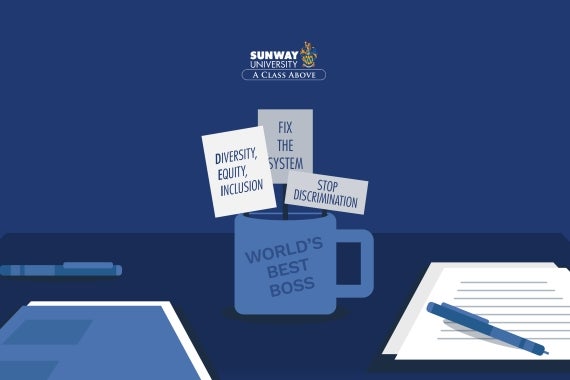Is Time Really the Enemy for a Manager Who Wants a Master's?

The climb up the executive ladder demands people management expertise, technical proficiency – and mastery of time management. Without adept time-management skills, navigating the responsibilities of a senior position becomes arduous, as meeting deadlines, coordinating projects, and overseeing teams require a finely tuned orchestration of time and priorities.
However, the time-management skills you’ve honed in moving upwards at work might benefit from further fine-tuning when you add another item to your plate: master’s degree studies.
Making time for a postgraduate programme can seem intimidating, especially when you’re holding management-level responsibilities at your job. You might ask yourself:
- Can I earn a master’s degree without disrupting my full-time job?
- Will studying a master’s while working cause me to drop the ball, professionally?
- How do I add a postgraduate programme into my already packed daily and working schedule, even if studying part-time?
- Will this be at the expense of family, sleep, and sanity?
While these are valid concerns, you can still achieve your career and academic goals with the right time-management methods. Here are 10 ways to refine time management for a manager taking up a master’s programme:

#1 Prioritise
Not all tasks are created equal. Employ the Eisenhower Matrix (Urgent/Important) to identify crucial work, important tasks, urgent study demands, and daily activities to delegate or eliminate. Your time is an investment, not a commodity.
#2 Time Block
Ditch the reactive "to-do" list and embrace the proactive power of time blocking. Schedule dedicated study periods on your calendar, treating them like meetings you can’t move. Treat these blocks the same way you would treat scheduled key meetings during your work hours.
#3 Delegate Work
You're not a one-person powerhouse – no one is. Empower your team to own tasks, freeing your bandwidth for critical work projects and focused study. Remember: delegation isn't weakness, it's leadership. So, learn to let go.
#4 Embrace Micro-Learning
Gone are the days of marathon study sessions. Leverage micro-learning platforms, podcasts, and audiobooks to catch up on your master’s degree studies while on your commute, lunch break, or even that short wait for coffee. Learning in bite sizes not only helps reduce stress, but also improves learning retention. It’s a win-win.
#5 Tech is Your Time-Saver
Utilise project management tools to organise tasks, create a study schedule, set deadlines, and collaborate with fellow students. Time-tracking apps can quantify your productivity and reveal hidden time inefficiencies. And, enrolling in a master’s programme delivered fully online eliminates the time commitment required to travel to and from campus.
#6 Master the Power of "No"
Learn to decline requests that don't align with your priorities, gracefully but firmly. This might be difficult at first, but it’s key to maintaining a healthy work-study-life balance. Saying "no" to the unimportant empowers you to say "yes" to what’s actually important – and bring you one step closer to completing your master’s studies.
#7 Fuel Your Focus, Not Your Stress
Don’t take for granted what enough rest, a good diet, and adequate exercise can do for your mental health – ultimately helping to free up your time. How so? When you’re feeling good mentally and physically, you’re able to focus better on your tasks, leading to quicker completion. Even a low-impact activity like taking a walk can do wonders to manage stress and refocus the mind.
#8 Embrace the Power of Community
Connect with fellow students in your master’s programme for peer-to-peer learning. It can be a real time-saver to have another student help you understand a particularly tricky concept covered in the course. You are not alone in your master’s degree journey, so don’t hesitate to start a conversation.
#9 Celebrate Small Wins
Don't wait for graduation to celebrate success. Acknowledging and rewarding yourself for completing chapters, conquering tough concepts, or acing assessments helps fuel forward momentum and prevent burnout. When you burn out, you become less productive and take longer to strike things off your to-do list.
#10 Reflect and Adjust
Regularly assess your schedule and make adjustments as needed. Be open to changing strategies if certain approaches are not working as well as expected. It would be a waste of time to persist in using time-management methods that are not effective for your particular situation.

A Master’s isn’t for Everyone
While these time-management strategies can equip you for success in your postgraduate journey, be honest with yourself. Studying for a master’s degree isn't for everyone.
Consider if you:
- Are driven by a whim, not a clear goal: a master’s requires commitment for completion. Ensure your motivation is intrinsic, not external.
- Lack a strong support system: Friends and family are your cheerleaders, providing you much-needed encouragement when you need it. Ensure you have a rock-solid support network in place.
- Are already bogged down by your schedule: Don't add fuel to the fire. If your current workload is already overwhelming, adding a master’s programme to your schedule might be too much for now.
Master Your Time, Master Your Success
Time management isn't about trying to squeeze more hours into a day; it's about effectively making the most of the hours you have. And, pursuing a postgraduate degree as a busy professional is not just about academic achievement or moving up the rungs of the career ladder – it's about growing as a leader, a manager, and an individual.
With the right approach, even the busiest managers can master the clock and achieve their educational and professional goals.
Eager to start your master’s studies? Schedule a chat with our Education Counsellors here.





